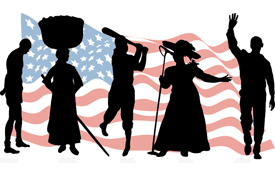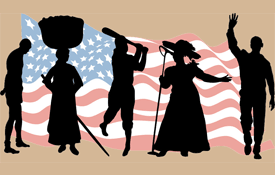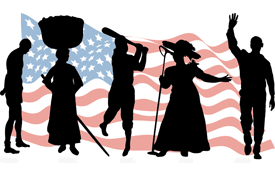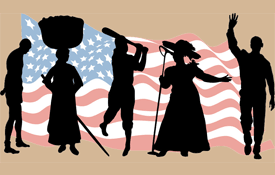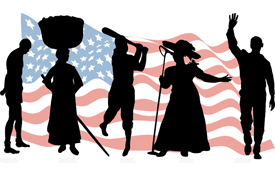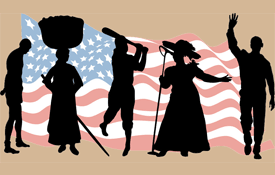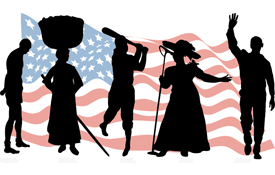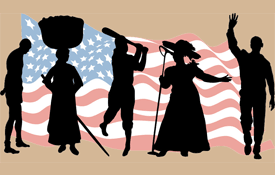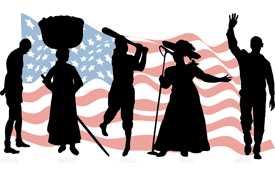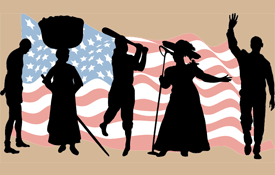Categories
-
0 James Weldon Johnson's Community Connection
- Music
- by Hugh Smith
- 10/10/2007
James Weldon Johnson, (1871-1938), wrote the famous poem, "Lift Every Voice and Sing" - now known as The Negro National Anthem. He wrote several books and poems, including, The Autobiography of an ex-Colored Man, (1912), and Negro American, What Now? (1934). Johnson collaborated with his brother to write hundreds of songs. Many of these tunes were featured on Broadway. He was the first African American admitted to the Florida Bar, marking another of his numerous accomplishments as a contributor to black history. President Teddy Roosevelt appointed Johnson U.S. Consul to Venezuela and Nicaragua in 1906. Johnson joined the NAACP in 1916, and became Executive Secretary of the organization in 1920.
-
0 50th Anniversary of “the Little Rock Nine” Students who made Black History
- Civil Rights
- by Hugh Smith
- 09/05/2007
Ernest Green and Daisy Bates are important black history people central to the story of the "Little Rock Nine." Little Rock Nine student Ernest Green was cast into the national spotlight in 1957 integrating all white Central High School in Little Rock, Arkansas. He graduated in 1958, then went on to achieve his B.A. from Michigan State University in 1962, and his M.A. in 1964. In 1977, President Jimmy Carter nominated Green to become Assistant Secretary of Labor in charge of employment and training. Activist Daisy Bates co-founded Arkansas' State-Press Newspaper. In 1953, she was elected President of the Arkansas Conference of NAACP branches. After the 1954 Brown vs. the Board of Education of Topeka, Kansas Supreme Court case (outlawing segregation in public schools), Bates pressured the Little Rock School Board to desegregate. In 1957, nine students were selected to enroll in Central High School. Twice during September of 1957, the Little Rock Nine were prevented from entering Central High. Daisy Bates appealed to President Eisenhower. Eisenhower sent federal troops to Little Rock and the nine students were enrolled. Governor Faubus of Arkansas then closed the high schools. In August, 1958, the U.S. Eight Circuit of Appeals reopened the high schools.
-
0 20 Black History Attorneys Take the Law into their own Hands
- Law
- by Hugh Smith
- 08/22/2007
During the golden age of the civil rights movement, a prestigious law degree meant ambitious graduates had a powerful new tool to use to help facilitate social change. Challenges to the legal system could be channeled through the courts by a new generation of activists and leaders. Here are 20 people in black history who took advantage of their law degrees to move society forward. Dr. Sadie Tanner Alexander was the first black woman graduate of the University of Pennsylvania Law School, 1927. She was the first Black woman admitted to the Philadelphia Bar Association. Justice Jane M. Bolin, a graduate of Wellesley College and the Yale Law School, was appointed judge to the Court of Domestic Relations in New York City by Mayor Fiorello LaGuardia on July 22, 1939. Her appointment made her America's first African American woman judge. Patricia R. Harris, (1924-1985), was an African American woman of many firsts. She was the first black woman in charge of an American embassy as Ambassador to Luxembourg in 1965. She graduated from Howard University in Washington D.C., earned her Masters from the University of Chicago, and her law degree from George Washington Law School. She's excelled as a civil rights advocate, law judge, and law firm partner. Judge William H. Hastie, (1904-1976), was the first African American federal judge. He was born in Knoxville, Tennessee, and raised in Washington, D.C. Hastie earned his law degree from Amherst College, and a Ph.D. in juristic science from the Harvard Law School. His outstanding career is marked by numerous achievements: faculty member of the Howard Law School, Assistant Solicitor of the Department of Interior, Dean of the Howard Law School, youngest U.S. Federal judge at age 32 (1936). Benjamin L. Hooks became the first black criminal court judge in Tennessee in 1965. He was the first African American member of the Federal Communications Commission in 1972. In 1977, Hooks succeeded Roy Wilkins to become Executive Director of the nation's top civil rights organization, the NAACP. Rev. Hooks earned his law degree from De Paul University in 1949. Early in his career he was a public defender, a politician, a Baptist minister, and a vice president of a saving and loan association. Charles H. Houston, (1895-1950), was a premier constitutional lawyer and civil rights pioneer. Under his watch as Dean at the Howard University Law School, many great lawyers were educated, including future Supreme Court Justice Thurgood Marshall. Houston is credited with planing the strategy (before his death) for the landmark Brown vs. the Board of Education of Topeka, Kansas (successfully argued before the U.S. Supreme Court by Thurgood Marshall in 1954). Jane Edna Hunter, (1882-1971), founded the Phillis Wheatley Association in 1911, and the Phillis Wheatley Foundation Scholarship fund for black students. This South Carolinian achieved law school success, including passing the Ohio state bar. Jane Edna Hunter was an inspirational role model for her community. Barbara Charlene Jordan, (1936-1996), from Houston, Texas, graduated from Texas Southern University in 1956, and from Boston University Law School in 1959. Jordan was elected to the Texas State Senate in 1966, becoming the state's first black Senator since 1883. She was elected to the U.S. House of Representatives and spent six successful years there (1973-1978). In 1982, she stepped away from national politics to become a professor at the Lyndon Baines Johnson School of Public Affairs at the University of Texas in Austin. Vernon E. Jordan Jr. has had a colorful career as a noted civil rights leader and as a powerful Washington, D.C. lawyer. He earned his law degree from Howard University in 1960. In the 60's he was quite involved with civil rights as Field Secretary for Georgia's NAACP. In 1971, Jordan became National Director of The Urban League. He quit the Urban League in 1981 to practice law full time. Amayla Kearse was the first woman named to the Federal Appeals Court in New York. President Jimmy Carter nominated her to the Second U.S. Circuit Court of Appeals in 1979. Kearse, a respected judge, earned her law degree from the University of Michigan. Thurgood Marshall, (1908-1993), changed history in 1954 when he successfully argued Brown vs. the Board of Education before the U.S. Supreme Court. The Brown case outlawed segregation in schools. He was educated at Lincoln University and Howard Law School. Marshall began practicing law in 1933, became assistant special counsel for the NAACP in 1936, then chief counsel in 1938. He was the first director/chief counsel for the NAACP Legal Defense Fund (1940-1961). In 1961, President John Kennedy appointed him Second Circuit United States Court of Appeals judge. By 1965 he was appointed solicitor general in the Department of Justice. Marshall was appointed to the U.S. Supreme Court by President Lyndon Johnson in 1967 becoming the first African American on the court. Marshall is considered the most prominent civil rights lawyer of the 20th Century. Judge Wade Hampton McCree was nominated U.S. Solicitor General in 1977 by President Jimmy Carter. President Lyndon Johnson appointed him to the U.S. Sixth Circuit Court of Appeals in 1966. President John F. Kennedy named him to a U.S. District Court Judge seat in 1961. McCree, a World War II veteran, is a graduate of Fisk University and Harvard Law School. Arthur W. Mitchell, (1886-1968), was the first black Democrat elected to the U.S. Congress (1934 - 1943). Mitchell studied under Booker T. Washington at Tuskegee Institute. The Congressman, representing the First Congressional District of Illinois, received his law school instruction at Columbia and Harvard. Attorney Constance Baker Motley, (1921 - 2005), started her brilliant civil rights career with the NAACP Legal Defense Fund in 1945 as a law clerk. She was educated at Fisk, New York University, and Columbia Law School. Motley was an Assistant Counsel by 1950. She was part of the law team to win Brown vs. The Board of Education in 1954. Motley successfully argued James Meredith vs. The University of Mississippi in 1962. She was elected a New York State Senator in 1964, and became the first black woman to hold the position of borough President of Manhattan in 1965. In 1966, President Lyndon Johnson appointed her to a seat as the first African American woman Federal District Judge. Her bench was in the Southern District of New York. Dr. Pauli Murray, graduate of Howard University Law School, received her Doctorate from Yale. In 1945, she was the first African American to serve as Deputy Attorney General in California. Dr. Murray, active in civil rights, became an ordained Episcopal Priest in 1977. Judge James B. Parsons was the first African American Federal Judge in the United States. (1961). Judge Parsons presided over U.S. District Court in Chicago, Illinois. He received his law degree from the University of Chicago. Howard University graduate Vel Phillips was the first African American woman to receive a law degree from the University of Wisconsin. The Milwaukee native became Wisconsin's first woman elected Secretary of State. Princeton New Jersey's famous graduate Paul Robeson (1898-1976) is best known as the consummate "Renaissance Man." He spoke or read over 20 languages, including Russian and Chinese. Robeson may have been the most internationally famous African American in the 1930's. He carved out a lasting legacy as a world class artist, activist, singer, actor, lawyer, and athlete. A Phi Beta Kappa Rutgers University graduate and a Columbia Law School graduate, Robeson was the first African American "All American." Judge Edith Sampson was born in Meadville, Pennsylvania. She was the first woman to earn a law degree from Loyola University. Sampson was the first African American United Nations delegate (appointed by President Harry Truman in 1950). Judge Sampson was the first black woman elected to the U.S. Circuit Court of Cook County (Chicago) bench in 1962. Harold Washington, (1922-1987), was Chicago's first black Mayor (1983). He graduated from Northwestern University in 1952 with a law degree and worked as a lawyer for the city of Chicago from 1954-1958. Washington became an arbitrator for the Illinois Industrial Commission between 1960-1964. In 1965, he was voted into his first elected office serving six terms in the Illinois State Legislature (1965-1976).
-
0 Henry Aaron the Trailblazer for Survivor Barry Bonds
- Sports
- by Hugh Smith
- 08/08/2007
Two different eras, two different people, and one amazing record that continues to astonish the sports world. Hank Aaron's America of the 1950's, 1960's, and 1970's was a different world from today's social environment in and outside of baseball. Aaron's achievement was clearly associated with not only sports greatness, but with civil rights advancement and black history, reflective of mid and late 20th Century cultural changes in America. It's clear that the Aaron milestone, more than Barry Bonds' achievement (noted below), was a crowning confirmation of the capabilities of African Americans (in a society of doubters) during the age of Ali, R&B, and Roots. Let's look back on the Aaron legacy. Henry Aaron is the only corporate executive in the world that can brag about hitting 755 lifetime home runs as a player in United States Major League Baseball. Hammerin’ Hank passed Babe Ruth’s record on April 8th, 1974 when he hit home run number 715. Aaron became a professional player in 1952 for the Indianapolis Clowns, a black barnstorming team. The National League Milwaukee Braves purchased his contract for $2,500 and assigned him to their Eau Claire Wisconsin farm team the same year. Hank Aaron was promoted to Jacksonville in the Sally League in 1953 finally breaking in at the major league level in 1954, never to look back. On August 1, 1982, Aaron was inducted into the baseball Hall of Fame in Cooperstown, New York. He's now the second greatest home run hitter of all time (Barry Bonds passed him with 756 on August 7, 2007). In life after baseball, Henry Aaron has been a success in the business world as a corporate Vice President of Community Relations for Turner Broadcasting System, Inc.
-
0 Stevie Wonder & Aretha Franklin to Headline the Martin Luther King Jr. Dream Concert
- News
- by Hugh Smith
- 07/24/2007
With another $20 million needed to finish the Martin Luther King Jr. Washington, DC National Memorial, the race is on to capture more support for the project. Radio City Music Hall in New York City will host the Dream Concert on Tuesday, September 18, 2007, to benefit the DC King memorial. Stevie Wonder, Aretha Franklin, Carlos Santana, Jessye Norman, Bebe & Cece Winans, and Robin Thicke will perform. Garth Brooks, Queen Latifah, Joss Stone, and Kenny "Babyface" Edmonds will also share the stage. Whoopi Goldberg will be a guest presenter for the evening. Tickets go on sale Monday, July 30th, at 9am.
-
- Music
- by Hugh Smith
- 07/04/2007
Celebrating her 90th birthday, Lena Horne, entertainer extraordinaire, was born in Brooklyn, New York on June 30, 1917. She was a 16-year-old chorus girl at Harlem's famous Cotton Club in 1933. Horne's legacy includes success with radio, movies, television, records, and Broadway. Her first big Broadway role was in the 1957 production of "Jamaica" with Ricardo Montalban. As a singer, she's won 3 Grammy Awards. Horne has appeared in 16 Hollywood feature films.
-
0 Diana Ross Challenges 2007 BET Award Recipients to Raise the Bar
- Music
- by Hugh Smith
- 06/27/2007
On a night in which she was honored with a lifetime achievement award, Diana Ross had some positive words of wisdom for her inexperienced peers. Ms. Ross encouraged young artists gathered for the June 26, 2007 BET Awards that long careers are possible without using sleaze and vulgarities. Her 5 decades of success speaks well for Diana's magic staying power. As one of the most popular female vocalists of all time, Ms. Ross is now a black history role model for a new generation of performers. This photo is from her early 2007 I Love You CD. Diana is still cranking out the hits. From humble beginnings to international stardom, the career of Diana Ross has stood the test of time. She has reached out and touched the world as a recording legend, film actor, and night club performer. "The Boss" began her climb to fame at age 14 as part of a singing group with Mary Wilson and Florence Ballard. The Primettes sang at parties around Detroit, Michigan. They auditioned for Motown in 1960. Owner Berry Gordy renamed the group, the Supremes. The vocal trio belted out hit after hit during the 1960's. In 1970, Diana Ross went solo. She signed a huge recording contract with RCA in 1981 (after 20 years with Motown). In 1982, Diana's star was placed on the Hollywood Walk of Fame.
-
0 Civil Rights Pioneer Parren Mitchell
- Civil Rights
- by Hugh Smith
- 06/06/2007
Parren Mitchell, (1922 - 2007), who recently passed away at age 85, was the first African American to be elected to the U-S Congress from Maryland’s 7th District in 1970. He became Chairman of the Congressional Black Caucus in 1976. In 1950, Mitchell challenged the University of Maryland in the courts to become the school’s first black graduate student. As a congressman, he would continue to battle discrimination and open the doors of opportunity for all.
-
0 NYC Dream Concert to Benefit MLK JR DC Memorial
- News
- by Hugh Smith
- 05/23/2007
Quincy Jones, Russell Simmons, David Stern, Joel Horowitz, Edgar Bronfman Jr., and Tommy Hilfiger have come together to create The Dream Concert, a one-night benefit for The Martin Luther King Jr. Washington DC National Memorial. Stern is the Commissioner of the National Basketball Association, Bronfman the Chairman of the Warner Music Group, and Horowitz is the CEO of Tommy Hilfiger. Jimmy Jam and Terry Lewis will be the artistic directors of The Dream Concert. Jam and Lewis have produced Grammy Award winning albums for many artists, including Janet Jackson. The Martin Luther King Jr. Washington DC National Memorial project is running out of time to secure the rest of the money needed to finish construction. Groundbreaking took place on November 13, 2006. $21 million is still needed to complete the $100 million project. Muhammad Ali, Angela Bassett, Jamie Foxx, Whoopi Goldberg, Cuba Gooding Jr., Michael Jordan, Magic Johnson, Kerry Washington, and former New York City Mayor David Dinkins are on the host committee for the Tuesday, September 18, 2007 Dream Concert at Radio City Music Hall in the Big Apple. You can go to the Martin Luther King Jr. Memorial for further information. The King Memorial is scheduled to be completed in 2008.
-
0 Alex Haley: The Man Who Traced America's Roots
- History
- by Hugh Smith
- 05/09/2007
In honor of the 30th Anniversary of Roots, Reader's Digest has compiled a collection of outstanding Alex Haley articles written between 1954 - 1991. Alex Haley The Man Who Traced America's Roots also includes an excerpt from Roots. Race, politics, and class expert Lawrence Otis Graham introduces the book by highlighting some of Haley's accomplishments. Haley, a Pulitzer Prize-winning author, shook the conscience of America and the world when the story of his African ancestor Kunta Kinte was first published in 1976. Roots on television had an even bigger impact on millions of viewers as it humanized the story using emotional connections we all could relate to. Kunta Kinte's family story framed inside the vicious backdrop of slavery left a visual impact most people will never forget. The new book includes a fascinating 30 minute bonus DVD, with candid footage of Alex Haley talking about some of his challenges while writing Roots. Additional footage includes Malcolm X, Elijah Muhammad, and how Haley came to write about them in his Reader's Digest assignments. You'll also enjoy reading the section, "What Roots Means to Me." Halle Berry, B.B. King, Leslie Uggams, General Colin Powell, and others reflect on the impact of Roots on their lives. Audio highlights of these special comments are also included on the DVD.
